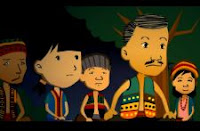The central role that indigenous peoples should play within Reducing Emissions From Deforestation and
forest Degradation (REDD+) is highlighted by a new community friendly video ‘’Our Forests, Our Life!
Indigenous Peoples and REDD+’ released by Asia Indigenous Peoples Pact (AIPP).
The production explains how industrialisation has led to global warming and climate change, and that the global demand for forest products is resulting in deforestation. The international agreement to slow and eventually halt forest loss under the REDD+ mechanism within the United Nations Framework Convention on Climate Change (UNFCCC) is introduced.
The video outlines the relevance of the United Nations Declaration on the Rights of Indigenous Peoples (UNDRIP) to REDD+, and the right to Free, Prior and Informed Consent (FPIC). It is explained that REDD+ is not fixed and that each country will adapt REDD+ to its particular conditions, therefore the full and effective participation of Indigenous Peoples is essential in all phases of REDD+. The need to include the contribution and participation of indigenous women as equals within the REDD+ process is also highlighted.
This is an excellent educational resource and complementary to the REDD+ e-module.
The production explains how industrialisation has led to global warming and climate change, and that the global demand for forest products is resulting in deforestation. The international agreement to slow and eventually halt forest loss under the REDD+ mechanism within the United Nations Framework Convention on Climate Change (UNFCCC) is introduced.
The video outlines the relevance of the United Nations Declaration on the Rights of Indigenous Peoples (UNDRIP) to REDD+, and the right to Free, Prior and Informed Consent (FPIC). It is explained that REDD+ is not fixed and that each country will adapt REDD+ to its particular conditions, therefore the full and effective participation of Indigenous Peoples is essential in all phases of REDD+. The need to include the contribution and participation of indigenous women as equals within the REDD+ process is also highlighted.
This is an excellent educational resource and complementary to the REDD+ e-module.

No comments:
Post a Comment